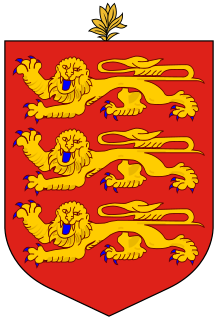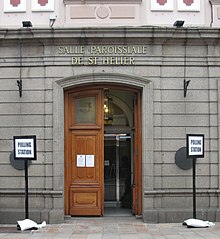
The Australian electoral system comprises the laws and processes used for the election of members of the Australian Parliament. The system presently has a number of distinctive features including compulsory enrolment, compulsory voting, majority-preferential instant-runoff voting in single-member seats to elect the lower house, the House of Representatives, and the use of the single transferable vote proportional representation system to elect the upper house, the Senate.

Electoral reform in New Zealand has, in recent years, become a political issue as major changes have been made to both Parliamentary and local government electoral systems.
The alternative vote plus (AV+), or alternative vote top-up, is a semi-proportional voting system. AV+ was devised by the 1998 Jenkins Commission which first proposed the idea as a system that could be used for elections to the Parliament of the United Kingdom.

The North East England devolution referendum was an all postal ballot referendum that took place on 4 November 2004 throughout North East England on whether or not to establish an elected assembly for the region. Devolution referendums in the regions of Northern England were initially proposed under provisions of the Regional Assemblies (Preparations) Act 2003. Initially, three referendums were planned, but only one took place. The votes concerned the question of devolving limited political powers from the UK Parliament to elected regional assemblies in North East England, North West England and Yorkshire and the Humber respectively. Each were initially planned to be held on 4 November 2004, but on 22 July 2004 the planned referendums in North West England and in Yorkshire and the Humber were postponed, due to concerns raised about the use of postal ballots, but the referendum in North East England was allowed to continue, particularly as it was assumed that the region held the most support for the proposed devolution.

A referendum was held in the Canadian province of British Columbia on May 17, 2005, to determine whether or not to adopt the recommendation of the Citizens' Assembly on Electoral Reform to replace the existing first-past-the-post electoral system (FPTP) with a single transferable vote system (BC-STV). It was held in conjunction with the BC Legislative Assembly election of 2005. Voters were given two ballots at that time: a ballot to vote for a Member of the Legislative Assembly of British Columbia (MLA) in their constituency and a referendum ballot. The referendum received considerable support from the electorate but failed in meeting the demanding threshold that had been set. A second referendum was held in 2009.

Elections in Jersey take place for the Assembly of the States of Jersey and at parish-level. Various parties have been formed over the years in Jersey, but few candidates stand for election affiliated to any political party. All elections in Jersey use the First-past-the-post voting system. In 2008, the voting age was reduced to 16 years.
BC-STV is the proposed voting system recommended by the Citizens' Assembly on Electoral Reform in October 2004 for use in British Columbia, and belongs to the single transferable vote family of voting systems. BC-STV was supported by a majority (57.7%) of the voters in a referendum held in 2005 but the government had legislated that it would not be bound by any vote lower than 60% in favour. Because of the strong majority support for BC-STV, the government elected to stage a second referendum in 2009, but with increased public funding for information campaigns to better inform the electorate about the differences between the existing and proposed systems. The leadership of both the 'yes' side and the 'no' side were assigned by the government. The proposal was rejected with 60.9% voting against, vs. 39.1% in favour, in the 2009 vote.

A referendum on restoring multi-party politics was held in Uganda on 28 July 2005. Political parties had been banned from competing in elections for nearly 20 years in order to curb sectarian tensions. President Yoweri Museveni instituted the non-party "Movement" system of government when he came to power in 1986. A referendum was held in 2000, but the proposal was rejected by over 90% of voters. This time it was approved by over 90% of voters.

The Jersey general election, 2008 was a series of elections that were taking place in two stages in October and November 2008 in Jersey.

A referendum on changing the electoral system to a two-round system was held in Romania on 25 November 2007, on the same date as the election to the European Parliament. The referendum was called by President Traian Băsescu on 23 October 2007 when the Parliament of Romania failed to meet a deadline set by him to pass these changes.
Electoral reform is change in electoral systems to improve how public desires are expressed in election results. That can include reforms of:

The United Kingdom Alternative Vote referendum, also known as the UK-wide referendum on the Parliamentary voting system was held on Thursday 5 May 2011 in the United Kingdom (UK) to choose the method of electing MPs at subsequent general elections. It occurred as part of the Conservative – Liberal Democrat Coalition Agreement drawn up after the 2010 general election which had resulted in the first hung parliament since February 1974 and also indirectly in the aftermath of the 2009 expenses scandal. It operated under the provisions of the Parliamentary Voting System and Constituencies Act 2011 and was the first national referendum to be held under provisions laid out in the Political Parties, Elections and Referendums Act 2000.

General elections for the States of Jersey were held in Jersey on 19 October 2011, and for the first time Senators, Deputies and Constables were elected on a single day in Jersey. The number of members of the States of Jersey was reduced from 53 to 51. Six Senators who had been elected in 2008 for a period of six years did not face election in 2011.

Lyndon John Farnham is a Senator and a member of the States of Jersey. He was first elected as Deputy (legislator) of St Saviour No. 2 district in 1999. He was re-elected as a Senator in 2011 and sworn to office on 14 November 2011 He was re-elected as a Senator in October 2014 and appointed as Minister (government) for Economic Development on 6 November 2014.

A referendum on electoral reform was held in Jersey on 15 October 2014, alongside general elections. Voters were asked whether elected constables should continue to automatically become members of the States. Their continued automatic membership was approved by 62% of voters.

General elections were held in Jersey on 15 October 2014, alongside a referendum on electoral reform.

A constitutional referendum was held in Thailand on 7 August 2016. The charter offered only semi-democracy and was seen to tighten military rule in Thailand. However, it was approved by 61% of voters with a 59% turnout. A second proposal for the next Prime Minister to be jointly elected by Senators and MPs was also approved. However, the opposition groups to the constitution were barred from formally campaigning against it by the military government, while the military government actively campaigned for its adoption.
The 2016 Plebiscite on Democratic Renewal was a non-binding referendum on electoral reform held in the Canadian province of Prince Edward Island between 27 October – 7 November 2016. This was the second electoral reform referendum to be held in Prince Edward Island, following a vote to maintain the status quo in 2005. The referendum asked which of five voting systems residents would prefer to use in electing members to the Legislative Assembly of Prince Edward Island. The referendum, after four instant run-off rounds, indicated mixed member proportional representation was the preferred choice with 55.03% support on the final ballot.

A referendum on the electoral system for the States was held in Guernsey on 10 October 2018.













